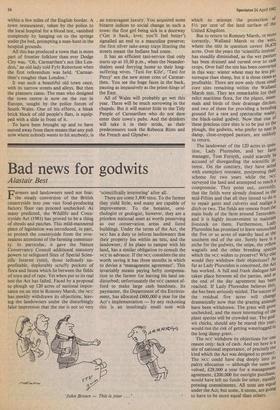Bad news for godwits
Alastair Best
Farmers and landowners need not fear: the steady conversion of the British countryside into one vast food-producing factory floor can proceed unchecked. As many predicted, the Wildlife and Coun- tryside Act (1981) has proved to be a thing of shreds and patches. This mild-mannered piece of legislation was introduced, in part, to protect the countryside from the over- zealous attentions of the farming communi- ty. In particular, it gave the Nature Conservancy Council additional statutory powers to safeguard Sites of Special Scien- tific Interest (sssi), those tediously un- profitable, deplorably scruffy pockets of flora and fauna which lie between the fields of soya and of rape. Yet when put to its real test the Act has failed. Faced by a proposal to plough up 120 acres of national impor- tance on an ssst in Romney Marsh, the NCC has meekly withdrawn its objections, leav- ing the landowners under the disturbingly false impression that the site is not so very
`scientifically interesting' after all.
There are some 3,800 sssts. To the farmer they yield little, and many are capable of improvement.' To the botanist, orni- thologist or geologist, however, they are a priceless national asset as worth preserving as our conservation areas and listed buildings. Under the terms of the Act, the NCC has a duty to inform landowners that their property lies within an ssst, and the landowner, if he plans to tamper with his land, has a similar obligation to consult the NCC in advance. If the NCC considers the site worth saving it has three months in which to devise a 'management agreement'. This invariably means paying hefty compensa tion to the farmer for leaving his land un- disturbed; unfortunately the NCC cannot af- ford to make large cash handouts. Its paymaster, the Department of the Environ- ment, has allocated £600,000 a year for the Act's implementation — by any reckoning this is an insultingly small sum with `John Brown — This is your . '
which to attempt the protection of 5' per cent of the land surface of the United Kingdom.
But to return to Romney Marsh, or more correctly, Walland Marsh to the west, where the sssi in question covers 16,670 acres. Over the years the 'scientific interest, has steadily diminished, as the wet pasture has been drained and turned over to cash crops. Over half the site has been converted in this way: winter wheat may be less pic- turesque than sheep, but it is three times as profitable. There are now only three small core sites remaining within the Wallann Marsh sssi. They are remarkable for then relict maritime flora, for the plants, mam- mals and birds of their drainage ditches, and two of them for providing a breeding ground for a rare and spectacular wader, the black-tailed godwit. Now that one of these precious core sites is to be put to the plough, the godwits, who prefer to nest In damp, close-cropped pasture, are unlikely to return.
The landowner of the 120 acres in ques- tion, Lady Plurenden, and her farm manager, Tom Forsyth, could scarcely be accused of disregarding the scientific in- terest. On the contrary, they have acted with exemplary restraint, postponing their scheme for two years while the NCC surveyed the land and attempted to reach compromise. They point out, correctly, that the fields were already drained in the mid-Fifties and that all they intend to do is to repair gates and culverts and realign a ditch or two. The fields are remote from the main body of the farm around Tenterden, and it is highly inconvenient to maintain livestock on them. Furthermore, LadY Plurenden has promised to leave untouched the five or so acres of marshy land at the southern end of the site. Surely here is a niche for the godwits, the snipe, the yellow wagtails and the other breeding species which the NCC wishes to preserve? Why else would they withdraw their objections? As far as Lady Plurenden is concerned, the Act has worked. A full and frank dialogue has taken place between all the parties, and at the end of the day agreement has been reached. If Lady Plurenden believes this, she has been seriously misled. The nature of the residual five acres will change dramatically now that the grazing animals have been withdrawn. The grass will grow unchecked, and the more interesting of the plant species will be crowded out. The god- wit chicks, should any be reared this }feat., would run the risk of getting waterlogged in the long damp grass. The NCC withdrew its objections for one reason only: lack of cash. And yet here is a site of national importance, of precisely the kind which the Act was designed to protect. The Ncc could have dug deeply into its in- volved, allocation — although the sums n- volved, £28,000 a year for a management agreement, £200,000 for outright purchase, would have left no funds for other, equally pressing commitments. All sssts are equal under the Act; but some, it seems, are going to have to be more equal than others.






































 Previous page
Previous page